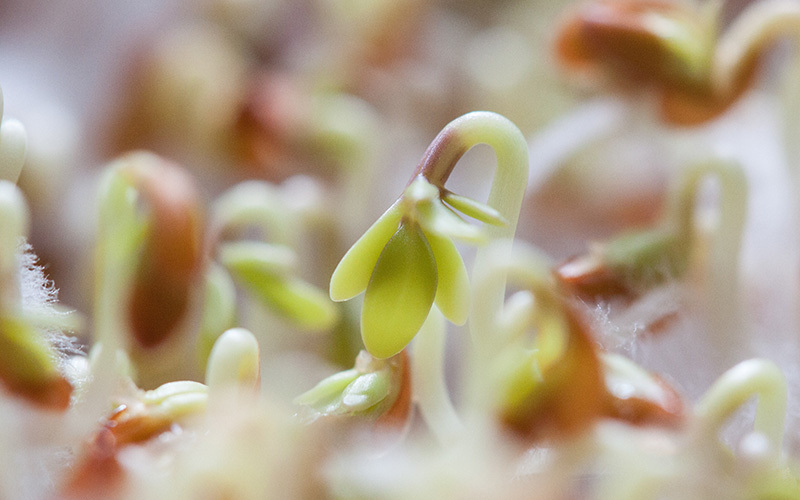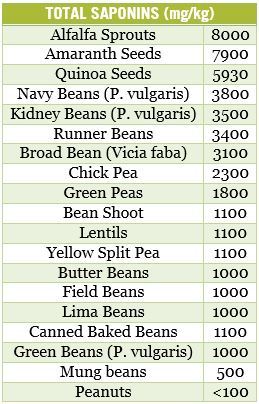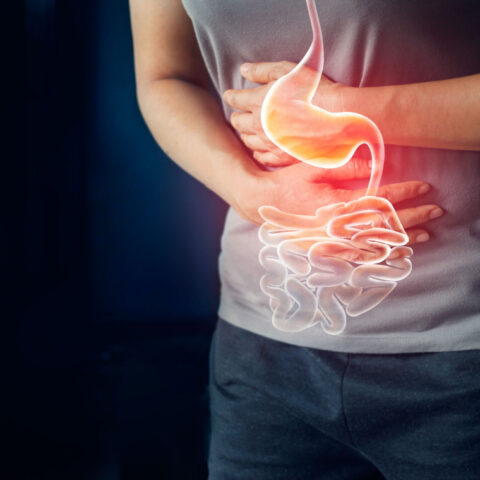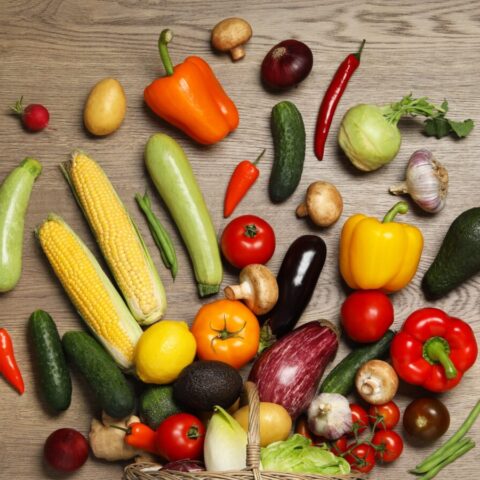Alfalfa Sprouts & Autoimmune Disease

As The Paleo Diet® concept increasingly gains traction worldwide, it has spawned an explosion of copy cat books over the past 3-4 years. Look no further than Amazon.com to literally see the hundreds of diet and cookbooks that manage to shoehorn the word “Paleo” into their titles. In a way, all of these books are a good thing because they tend to get more and more people involved in a lifetime way of eating that may improve health and well being, while reducing the risk for chronic diseases. The downside of this situation is that many authors are poorly informed and frequently provide misleading information about food, recipes and meals that are not “Paleo” by any stretch of the imagination.
We have recently written a number of comprehensive articles about some of these items including sea salt, dairy foods, honey and nut flours. I even understand that a popular Paleo influencer now added beans and legumes to his list of foods which are acceptable on contemporary Paleo Diets. Apparently, he has not read my lengthy article on the topic, nor is he aware of the notion that almost all beans and legumes are either inedible, poorly digestible or toxic in their raw state. Hence until humanity acquired the technology to create fire at will, legumes were not on the original menu that helped to shape our present day genome.
As I have previously explained, legumes both in their raw and cooked state contain a number of antinutrients (lectins, saponins, protease inhibitors, phytate, thaumatin like proteins among others) which can impair nutrition/health, adversely affect gut function, increase intestinal permeability and promote autoimmune disease. Increasingly, scientists studying autoimmune disease now recognize that a leaky gut represents a key environmental factor in triggering autoimmune disease in genetically susceptible individuals.1-3
Although the link between autoimmunity and legumes is poorly documented in humans, at least one legume is known to cause an autoimmune disease. Except for gluten containing grains (wheat, rye and barley), only alfalfa sprouts, seeds and supplements are known to elicit an autoimmune disease.
How alfalfa sprouts cause autoimmunity
While many people think alfalfa sprouts are good for you, the research is contrary. A long line of intriguing research in humans, primates and rodents4-33 demonstrates that alfalfa sprouts, seeds and supplements may cause an autoimmune disease known as systemic lupus erythematosus (SLE), particularly when consumed in excessive quantity. The classical explanation is that alfalfa contains an amino acid called L-canavanine which is thought to cause SLE via dysregulation of T and B lymphocytes in the immune system.6, 13, 14, 16, 18, 19, 30, 31, 33
However, this explanation may not fully explain why alfalfa sprouts, seeds and supplements cause autoimmunity.20 With the increasing realization that a leaky gut represents a fundamental environmental factor that underlies autoimmunity,1-3 then any food which has the potential to increase intestinal permeability may be suspect in autoimmune diseases.
Below is a table showing the saponin content of various foods. Note alfalfa sprouts tops the list.

One of the few raw legumes that we eat in the typical western diet are alfalfa sprouts. In vegetarian diets, they are standards in meatless sandwiches and vegetable salads. Alfalfa sprouts, seeds and supplements are potent sources of saponins23-28 which increase intestinal permeability. Most people eat alfalfa sprouts irregularly, so the potential adverse health effects of sporadic alfalfa consumption are probably of minor consequence, except for people suffering from autoimmune disease.
As a contemporary Paleo dieter, we should learn from the wisdom of our ancestral diet: a diet that rarely or never consisted of legumes.
Cordially,
Loren Cordain, Ph.D., Professor Emeritus
References
1. Fasano A. Leaky gut and autoimmune diseases. Clin Rev Allergy Immunol. 2012 Feb;42(1):71-8.
2. Fasano A. Zonulin and its regulation of intestinal barrier function: the biological door to inflammation, autoimmunity, and cancer. Physiol Rev. 2011 Jan;91(1):151-75
3. Fasano A, Shea-Donohue T.Mechanisms of disease: the role of intestinal barrier function in the pathogenesis of gastrointestinal autoimmune diseases. Nat Clin Pract Gastroenterol Hepatol. 2005 Sep;2(9):416-22
4. Livingston AL, Whitehand LC, Kohler GO. Microbiological assay for saponin in alfalfa products. J Assoc Off Anal Chem. 1977 Jul;60(4):957-60.
5. Malinow MR, McNulty WP, McLaughlin P, Stafford C, Burns AK, Livingston AL, Kohler GO. The toxicity of alfalfa saponins in rats. Food Cosmet Toxicol. 1981 Aug;19(4):443-5.
6. Malinow MR, Bardana EJ Jr, Pirofsky B, Craig S, McLaughlin P. Systemic lupus erythematosus-like syndrome in monkeys fed alfalfa sprouts: role of a nonprotein amino acid. Science. 1982 Apr 23;216(4544):415-7.
7. Bardana EJ Jr, Malinow MR, Houghton DC, McNulty WP, Wuepper KD, Parker F, Pirofsky B. Diet-induced systemic lupus erythematosus (SLE) in primates. Am J Kidney Dis. 1982 May;1(6):345-52.
8. Malinow MR, McNulty WP, Houghton DC, Kessler S, Stenzel P, Goodnight SH Jr, Bardana EJ Jr, Palotay JL, McLaughlin P, Livingston AL. Lack of toxicity of alfalfa saponins in cynomolgus macaques. J Med Primatol. 1982;11(2):106-18.
9. Roberts JL, Hayashi JA. Exacerbation of SLE associated with alfalfa ingestion.N Engl J Med. 1983 Jun 2;308(22):1361
10. Podell RN. Systemic lupus erythematosus. Does diet play a causative role? Postgrad Med. 1984 Jan;75(1):251-4.
11. Livingston AL, Knuckles BE, Teuber LR, Hesterman OB, Tsai LS. Minimizing the saponin content of alfalfa sprouts and leaf protein concentrates. Adv Exp Med Biol. 1984;177:253-68.
12. Malinow MR, McLaughlin P, Bardana EJ Jr, Craig S. Elimination of toxicity from diets containing alfalfa seeds. Food Chem Toxicol. 1984 Jul;22(7):583-7.
13. Weissberger LE, Armstrong MK. Canavanine analysis of alfalfa extracts by high performance liquid chromatography using pre-column derivatization. J Chromatogr Sci. 1984 Oct;22(10):438-40.
14. Alcocer-Varela J, Iglesias A, Llorente L, Alarcón-Segovia D. Effects of L-canavanine on T cells may explain the induction of systemic lupus erythematosus by alfalfa. Arthritis Rheum. 1985 Jan;28(1):52-7.
15. Corman LC. The role of diet in animal models of systemic lupus erythematosus: possible implications for human lupus. Semin Arthritis Rheum. 1985 Aug;15(1):61-9.
16. Prete PE. The mechanism of action of L-canavanine in inducing autoimmune phenomena. Arthritis Rheum. 1985 Oct;28(10):1198-200.
17. Morimoto I. A study on immunological effects of L-canavanine. Kobe J Med Sci. 1989 Dec;35(5-6):287-98.
18. Morimoto I, Shiozawa S, Tanaka Y, Fujita T.L-canavanine acts on suppressor-inducer T cells to regulate antibody synthesis: lymphocytes of systemic lupus erythematosus patients are specifically unresponsive to L-canavanine. Clin Immunol Immunopathol. 1990 Apr;55(1):97-108.
19. Montanaro A1, Bardana EJ Jr. Dietary amino acid-induced systemic lupus erythematosus. Rheum Dis Clin North Am. 1991 May;17(2):323-32.
20. Herbert V, Kasdan TS. Alfalfa, vitamin E, and autoimmune disorders. Am J Clin Nutr. 1994 Oct;60(4):639-40.
21. Whittam J, Jensen C, Hudson T. Alfalfa, vitamin E, and autoimmune disorders. Am J Clin Nutr. 1995 Nov;62(5):1025-6.
22. Farnsworth NR. Alfalfa pills and autoimmune diseases. Am J Clin Nutr. 1995 Nov;62(5):1026-8.
23. Timbekova AE, Isaev MI, Abubakirov NK. Chemistry and biological activity of triterpenoid glycosides from Medicago sativa. Adv Exp Med Biol. 1996;405:171-82.
24. Tava A, Odoardi M. Saponins from Medicago Spp.: chemical characterization and biological activity against insects. Adv Exp Med Biol. 1996;405:97-109.
25. Oleszek W. Alfalfa saponins: structure, biological activity, and chemotaxonomy. Adv Exp Med Biol. 1996;405:155-70.
26. West PR, Waller GR, Geno PW, Oleszek W, Jurzysta M. Liquid secondary ion mass spectrometry and linked scanning at constant B/ELSIMS/MS for structure confirmation of saponins in Medicago sativa (alfalfa). Adv Exp Med Biol. 1996;405:339-52
27. Lee MK, Ling YC, Jurzysta M, Waller GR. Saponins from alfalfa, clover, and mungbeans analyzed by electrospray ionization-mass spectrometry as compared with positive and negative FAB-mass spectrometry. Adv Exp Med Biol. 1996;405:353-64.
28. Bialy Z1, Jurzysta M, Oleszek W, Piacente S, Pizza C. Saponins in alfalfa (Medicago sativa L.) root and their structural elucidation. J Agric Food Chem. 1999 Aug;47(8):3185-92.
29. Brown AC. Lupus erythematosus and nutrition: a review of the literature. J Ren Nutr. 2000 Oct;10(4):170-83.
30. Bell EA. Nonprotein amino acids of plants: significance in medicine, nutrition, and agriculture. J Agric Food Chem. 2003 May 7;51(10):2854-65.
31. Akaogi J1, Barker T, Kuroda Y, Nacionales DC, Yamasaki Y, Stevens BR, Reeves WH, Satoh M. Role of non-protein amino acid L-canavanine in autoimmunity. Autoimmun Rev. 2006 Jul;5(6):429-35.
32. Nunn PB, Bell EA, Watson AA, Nash RJ. Toxicity of non-protein amino acids to humans and domestic animals. Nat Prod Commun. 2010 Mar;5(3):485-504.
33. Huang T, Jander G, de Vos M. Non-protein amino acids in plant defense against insect herbivores: representative cases and opportunities for further functional analysis.
Phytochemistry. 2011 Sep;72(13):1531-7.[/full_width]




